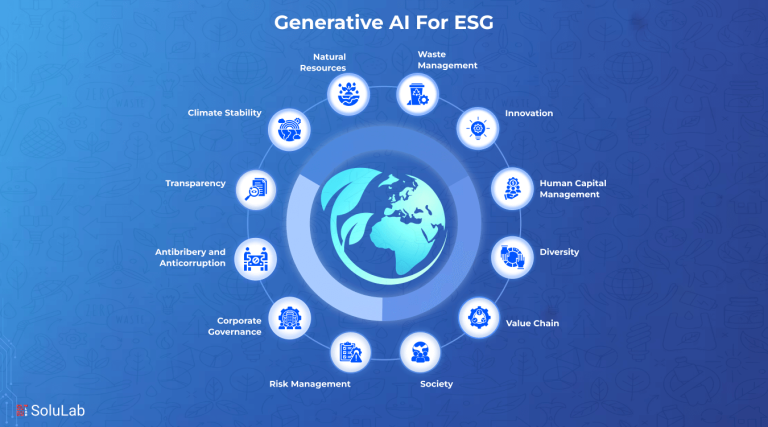Environmental, Social, and Governance factors have become critical business priorities today. Investors now demand transparency about sustainability practices before committing capital. Startups face mounting pressure to demonstrate responsible business operations early on.
Traditional ESG reporting methods consume valuable time and financial resources unnecessarily. Manual data collection often leads to inconsistencies and reporting errors. Artificial intelligence offers startups an efficient path toward comprehensive sustainability management.
How AI Transforms Environmental Social Governance Reporting
Smart technology streamlines complex sustainability data into actionable business insights. Machine learning algorithms identify patterns across vast environmental and social datasets. Automated systems reduce human error while accelerating compliance timeline significantly.
AI-powered platforms help startups track carbon emissions with remarkable precision. These tools analyze energy consumption patterns and recommend practical reduction strategies. Real-time monitoring enables companies to make immediate operational improvements.
Essential Categories of ESG Technology for Growing Companies
Carbon Footprint Management Solutions
Carbon accounting platforms calculate greenhouse gas emissions across entire operations. These systems track scope one, two, and three emissions automatically. Startups gain clear visibility into their environmental impact immediately.
Advanced algorithms process energy bills, travel data, and supply chain information. The technology translates raw data into standardized carbon dioxide equivalents. This automation saves countless hours compared to manual calculation methods.
Supply Chain Sustainability Tracking Tools
Supply chain visibility remains a significant challenge for socially conscious startups. AI tools map entire vendor networks and assess supplier sustainability practices. These platforms flag potential risks related to labor conditions and environmental standards.
Blockchain-integrated solutions provide transparent traceability throughout procurement processes automatically. Companies can verify ethical sourcing claims with documented proof easily. This level of oversight builds consumer trust and investor confidence.
Governance and Compliance Monitoring Systems
Regulatory requirements around ESG reporting continue expanding across global markets. Compliance software tracks changing regulations and ensures adherence to standards. Automated alerts notify teams about upcoming reporting deadlines and requirement changes.
Document management features organize policies, certifications, and audit trails efficiently. AI assistants help draft sustainability reports that meet specific framework requirements. These capabilities prove invaluable for startups with limited compliance expertise.
Practical Benefits of Implementing AI-Driven ESG Solutions
Cost Efficiency and Resource Optimization
Startups operate with constrained budgets and lean operational teams typically. AI tools eliminate the need for dedicated sustainability departments initially. Automation reduces consulting fees and manual labor costs substantially over time.
Energy optimization recommendations directly impact bottom-line operational expenses positively. Waste reduction strategies identified through AI analysis improve profit margins. The return on investment becomes evident within the first year.
Enhanced Stakeholder Communication and Reporting
Transparent sustainability communication strengthens relationships with customers and investors alike. AI platforms generate comprehensive reports that satisfy multiple stakeholder requirements. Visual dashboards present complex data in easily digestible formats.
Consistent reporting builds credibility and demonstrates genuine commitment to responsible practices. Stakeholders appreciate timely updates about environmental and social performance metrics. This transparency differentiates startups in increasingly competitive funding landscapes.
Competitive Advantage in Sustainable Business Practices
Early adoption of ESG AI tools positions startups ahead of competitors. Sustainable practices attract environmentally conscious customers and top talent actively. Companies with strong ESG credentials secure better partnership opportunities consistently.
Forward-thinking investors prioritize startups demonstrating measurable sustainability progress and commitments. ESG navigate Vsme capabilities help young companies establish robust frameworks early. This strategic advantage becomes harder for competitors to replicate later.
Selecting the Right ESG Technology for Your Startup
Assessing Your Specific Sustainability Needs
Different industries face unique environmental and social challenges that require consideration. Manufacturing startups prioritize emissions tracking while tech companies focus governance. Understanding your sector’s material ESG issues guides tool selection effectively.
Consider your current sustainability maturity level and available technical resources. Some platforms offer comprehensive solutions while others specialize in areas. Startups should match tool complexity with their organizational readiness realistically.
Integration Capabilities with Existing Business Systems
Seamless integration with accounting, HR, and operations software enhances efficiency dramatically. Look for platforms offering API connections to your current technology. Data silos create additional work and reduce the value significantly.
Cloud-based solutions typically provide better scalability as your startup grows. Mobile accessibility enables team members to contribute data from anywhere. User-friendly interfaces encourage consistent adoption across different departments and functions.
Scalability and Future-Proofing Your Investment
Choose platforms designed to grow alongside your expanding business operations. Today’s five-person startup may become tomorrow’s fifty-employee company quickly. Flexible pricing models prevent budget strain during rapid growth phases.
Regular software updates ensure compliance with evolving regulatory requirements automatically. Strong vendor support provides guidance as your ESG strategy matures. ESG navigate Vsme features should adapt to increasingly sophisticated reporting needs.
Taking Your First Steps Toward AI-Powered Sustainability
Starting with pilot programs allows startups to test tools without overcommitting. Focus initially on measuring your most material environmental or social impacts. Quick wins build internal momentum and demonstrate value to stakeholders.
Engage your team in the selection and implementation process early. Employee buy-in determines whether new systems succeed or languish unused. Training sessions ensure everyone understands how to contribute data accurately.
The sustainability journey requires consistent effort and genuine organizational commitment. AI tools provide the infrastructure, but human leadership drives meaningful change. Smart technology combined with authentic values creates lasting competitive advantage.
Embracing ESG AI solutions today prepares startups for tomorrow’s business landscape. The question is no longer whether to adopt these tools. The real question is how quickly you can start.

